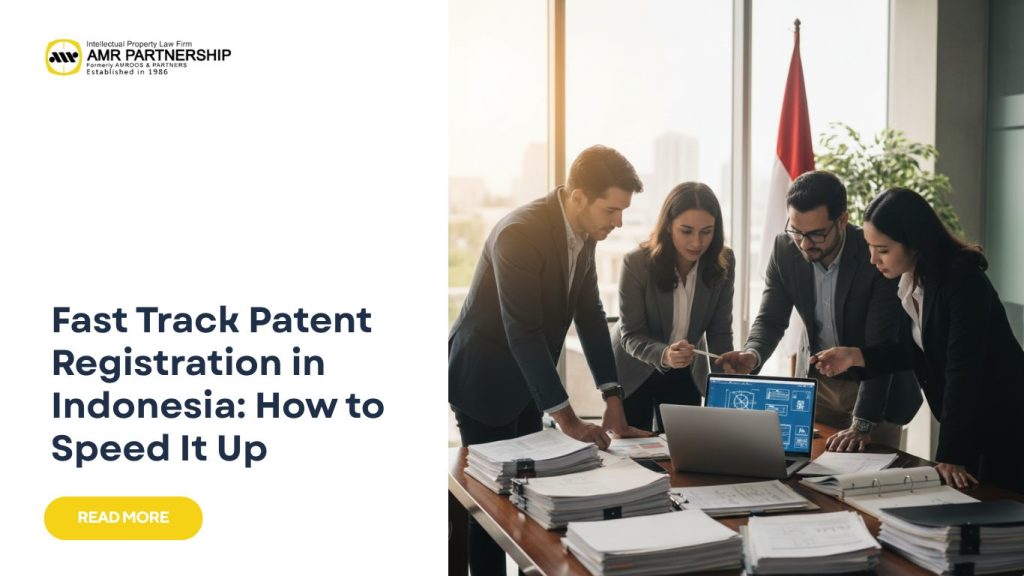
Getting a patent approved in Indonesia has traditionally been a lengthy process, often taking two to three years before a certificate is issued. For innovators and companies eager to protect their ideas quickly, this can feel like an eternity. However, through the fast track patent registration Indonesia available at amr.co.id, applicants can now shorten the time it takes to secure patent protection. This approach ensures that your innovation enters the market faster, with legal safeguards in place to protect your intellectual property.
But before you jump into the process, it’s essential to understand how the patent system in Indonesia works and how you can make the most of the available fast-track options.
READ MORE: The Real Challenges Behind Medical Device Patent Application Services
Understanding the Basics, Patent vs. Utility Model
Before filing, it helps to know whether your innovation qualifies as a Patent or a Utility Model. Both provide protection, but they differ in complexity and duration.
- Patent covers new inventions that involve an inventive step and are industrially applicable. These usually include groundbreaking technologies or processes.
- Utility model protects innovations that improve existing products or methods without requiring a significant inventive step.
For example, if your team has developed a completely new type of energy storage system, it likely qualifies as a patent. But if you have redesigned an existing battery to make it more efficient or safer, it may fall under a utility model.
Understanding this difference early on can help you choose the right path, saving both time and costs during the fast track patent registration in Indonesia.
Knowing where your invention fits also helps streamline your documentation, preventing unnecessary revisions later in the process.
READ MORE: Design Patents in Fashion: How Style Meets Legal Protection
What You Need to Prepare Before Filing
A smooth application begins with solid preparation. Before you file your patent or utility model, make sure the following documents are ready:
- Patent Description Document – This includes a detailed explanation of your invention like description, claims, abstract, and drawings.
- Deed of Assignment – A document transferring ownership from the inventor to the applicant, including names, addresses, and signatures.
- Statement of Invention Ownership – Signed and duty-stamped by all inventors.
- Company Establishment Documents – If the applicant is a company.
- Proof of Payment – For the application and examination fees.
Preparing these documents accurately helps reduce potential rejections during the formal examination stage. Remember, even minor inconsistencies – such as mismatched invention titles or missing signatures – can cause unnecessary delays.
Pro tip: Preparing all documents early can make your fast track patent registration in Indonesia run much smoother later. If you’re unsure how to format your claims or description, consider consulting an IP professional who can align them with DGIP standards.
READ MORE: How Landmark Patent Cases Shape the Role of a Patent Lawyer in 2025
The Five Stages of Patent Registration (Simplified!)
The Directorate General of Intellectual Property (DGIP) oversees patent registration in Indonesia. Understanding the main stages can help you anticipate timelines and prepare accordingly.
1. Application & Formalities Check (0–6 months)
DGIP verifies that all required documents are complete and comply with the standards. Missing signatures, mismatched data, or incomplete descriptions can lead to rejection.
2. Waiting Period (6–18 months)
Applicants have a window to revise or correct any issues identified during the formal examination. This stage is also where you can prepare for the next step—publication.
3. Publication (6 months)
Your application is published to the public. This allows third parties to review and, if necessary, file oppositions.
4. Substantive Examination (up to 30 months)
During this phase, DGIP assesses whether your invention is genuinely novel, inventive, and industrially applicable. This is the most critical part of the process.
5. Patent Certificate Issuance (2–3 months)
Once approved, you will receive your official patent certificate. Congratulations—your invention is now protected under Indonesian law.
Overall, this process can take two or more years. However, there are now mechanisms that allow inventors to move through some of these stages more quickly.
READ MORE: How a Patent Company Interprets Global Biotech Innovation Trends Through Patent Strength
How to Accelerate the Process (Fast Track Explained)
The DGIP provides specific options for accelerating the registration process, commonly known as fast track patent registration in Indonesia. These include:
- Accelerated publication, applicants can request their application to be published earlier than the standard waiting period.
- Fast-track examination, applicants may request early substantive examination if they meet specific requirements.
To qualify, you generally need to submit a written request, provide valid reasons (such as commercial urgency or international deadlines), and pay a small additional fee.
Benefits of the Fast-Track Option
- Faster protection, your invention gets legal protection sooner, allowing early commercialization.
- Earlier licensing opportunities, you can license or sell your patent earlier, generating revenue sooner.
- Global advantage, faster approval strengthens your position for international filings under treaties like the PCT.
Partnering with an experienced IP consultant ensures all technical documents and procedural steps comply with DGIP rules. An expert can also advise whether your case meets the criteria for fast-track treatment and how to avoid administrative errors that could slow down the process.
READ MORE: How Leading Patent Law Firms in Indonesia Contribute to ASEAN Intellectual Property Diplomacy
Common Mistakes That Can Slow You Down
Even with fast-track options, some mistakes can cause delays. Common pitfalls include:
- Inconsistent invention title between forms and documents.
- Missing inventor signatures on ownership or assignment deeds.
- Unpaid substantive examination fees or proof of payment errors.
- Poorly formatted patent descriptions that do not meet DGIP standards.
These issues can cause the DGIP to return your application or mark it as incomplete. A professional review before submission helps avoid these setbacks. This ensures your application moves efficiently through each stage, keeping your fast track patent registration in Indonesia truly fast.
READ MORE: Understanding Patent Law and Its Challenges in the Age of Artificial Intelligence
Maintaining Your Patent After Grant
Once your patent is granted, your responsibility doesn’t end there. To maintain protection, patentees must submit an annual patent working statement through the DGIP’s online system. This document confirms whether the patented invention has been implemented in Indonesia, either through manufacturing, importation, or licensing.
Failing to submit this statement can lead to penalties, including possible compulsory licensing or even revocation of the patent. Maintaining compliance ensures your rights remain valid and enforceable.
Why Work with an Experienced IP Consultant
Filing a patent is more than just filling out forms—it’s a strategic legal process. An experienced IP consultant can help with:
- Assessing whether your invention qualifies for fast-track registration.
- Preparing all required documents in the correct format.
- Submitting applications through the DGIP online filing system.
- Monitoring deadlines for examination, publication, and maintenance.
- Ensuring compliance with the latest DGIP regulations.
Professional assistance not only saves time but also minimizes the risk of costly rejections. Consultation fees for patent registration services in Indonesia vary depending on the type of patent, document complexity, and acceleration requests. To get an accurate estimate, it’s best to consult directly through WhatsApp or Instagram chat for personalized assistance and pricing guidance.
READ MORE: Patent Search Price in Indonesia and What Foreign Applicants Need to Know
Wrapping It Up
Patent protection in Indonesia doesn’t have to be slow or complicated. By leveraging the fast track patent registration in Indonesia, you can secure your intellectual property faster and gain a competitive edge in your industry. With proper preparation, accurate documentation, and expert guidance, your journey to patent approval can be smooth, strategic, and efficient.
For more information on filing or accelerating your patent application, visit amr.co.id and connect with a professional consultant through WhatsApp for tailored support and detailed pricing options.
- Phone (Hunting): +62-21-29036668
- Fax: +62-21-29036672 to 75
- WhatsApp Customer Service: Click here to chat
- Instagram: @amrpartnership
- TikTok: @amr.partnership
- Facebook: Law Firm AMR Partnership
- Official Website: www.amr.co.id






